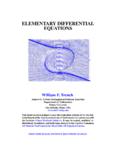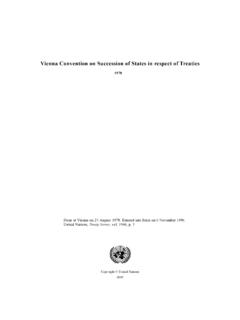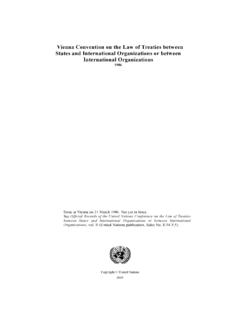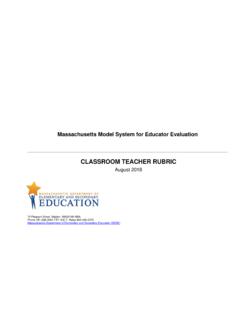Transcription of Assessment for learning - ed
1 Mar a Teresa Fl rez and Pamela Sammons Oxford University Department of EducationAssessment for learning : effects and impactAssessment for learning : effects and impact Copyright CfBT Education Trust 2013. The views and opinions expressed in this publication are those of the authors and do not necessarily represent the views of CfBT Education improvement: international reviews of best practiceWorking with partners including the Department of Education at Oxford University, the Centre for Equity in Education at the University of Manchester, the University of Glasgow, the University of Nottingham and the Hong Kong Institute of Education, CfBT Education Trust has commissioned a series of reviews of international literature. These reviews cover a range of topics related to school improvement including Assessment for learning ; the inclusion of students with special educational needs; effective teaching practice; school self-evaluation; and successful school idea that schools can impact positively on student outcomes is a crucial driver in the rise of interest in school improvement research and practice.
2 These reviews highlight international examples of best practice in order to effect change and identify how effective school improvement manifests itself. It forms a useful tool for schools and school leaders, but also acts as a lesson for policymakers in terms of what works around the review focuses on: Assessment for learning Assessment for learning where the first priority is to promote learning is a key means of initiating improvement. The features, strategies and principles underpinning Assessment for learning form the basis of this other four reviews in this series focus on:From exclusion to inclusion With a specific focus on children with special educational needs (SEN), this review addresses the forms of classroom practice that can help all children to participate. The review particularly focuses on elements of inclusive education and the implications for schools and school teaching Teachers are one of the key elements in any school and effective teaching is one of the key propellers for school improvement.
3 This review is concerned with how to define a teacher s effectiveness and what makes an effective teacher. It draws out implications for policymakers in education and for improving classroom self-evaluation for school improvement School self-evaluation can be a fundamental force in achieving school improvement. This review establishes what the key debates are in relation to school self-evaluation, what principles and processes are associated with it, and what the implications are for school self-evaluation as a means of leading school improvement. The review incorporates a framework for conducting self-evaluation and case study examples from systems and schools that have previously undergone the leadership School leaders are under considerable pressure to demonstrate the contribution of their work to school improvement, which has resulted in the creation of a wide range of literature which addresses leadership in the context of school improvement.
4 This review pays particular attention to issues including transformational leadership, instructional/pedagogical leadership and distributed is a world authority on school improvement. We work directly with schools and governments improving education outcomes through evaluation, training and professional development programmes. This series of reviews fits into our aim to develop evidence for education and supports our goal to provide school improvement programmes which are evidence for learning : effects and impact ContentsExecutive summary 2 Introduction 3 What is Assessment for learning ? 6 Assessment for learning put into practice 12 Effects and impact of Assessment for learning 16 Guidelines for policymaking and practice 19 Glossary 23 References and further reading 242 Assessment for learning : effects and impact Executive summaryAssessment that is for learning , as opposed to merely of learning , looks forward as well as back.
5 Teachers who assess in this way are concerned not just to confirm and verify what their students have learnt, but also to help their students and themselves understand what the next steps in learning should be and how they might be attempted. This kind of Assessment has a formative purpose: it helps to shape what lies ahead rather than simply to gauge and record past main strategies considered important for Assessment for learning (AfL) sharing learning goals, formative feedback, peer and self- Assessment , and the formative use of summative tests have been found to be overwhelmingly positive in terms of their potential to promote improvements in teachers classroom review proposes that in order to encourage AfL, subject departments: have an atmosphere in which teachers are expected to watch others in action to actively support peer observation recognise and value current skills and help teachers to identify their current formative practice.
6 Have meetings where teachers discuss learning give teachers time to plan well by encouraging them to mark less, but mark review concludes by identifying two sets of guidelines, for policymaking and practice. The former include: the use of national testing and Assessment strategies and the role of public examinations must be evaluated in terms of their consistency with AfL, implementing if necessary national Assessment systems with a greater degree of teacher involvement policymakers should give clear information to the educational community and the public about the views on Assessment which are to be promoted or prioritised in an education system, in order to avoid confusion and overlapping of approaches among latter include: whole-school commitment to the AfL approach involvement and leadership of senior staff is especially important to embed AfL clarity of messages is also relevant at the school level a change towards Assessment for learning should be informed and explained to all stakeholders, including students and parents teachers should attend well developed and recognised professional development programmes that help them to develop a flexible and deep understanding of the sense of the approach, and not just to accumulate a set of techniques they might apply without the required level of reflection.
7 3 Assessment for learning : effects and impact1 Black et al. (2004: 2-3). The Assessment Reform Group originated in 1989 as a voluntary group of researchers concerned with providing a research basis for decisions on Assessment policymaking and practice in the UK. Their work has been closely related to teachers and educational practice in order to complement Assessment theory with the needs and the wisdom of practice. Most of the texts selected for this review consider the ARG s conceptualisation of Assessment for learning , either as their unique definition of the concept or intertwined and contrasted with the ones proposed by other two main aims of this paper are to give an outline of the main characteristics of Assessment for learning (AfL) and to synthesise key research evidence on the effects and impact of this approach through a systematic process of literature paper provides a brief description of the main features, principles and strategies that underpin the concept of Assessment for learning , as well as information on how this approach has been put into practice in different contexts.
8 Findings about the effects and impact of Assessment for learning on student outcomes and teachers classroom practice are presented and some guidelines for policy-making and practice on Assessment derived from research are developed. In addition, the paper identifies some of the criticisms that have been made of this perspective and the limitations of current knowledge on its most quoted definition of AfL is the one developed by the Assessment Reform Group (ARG) in the UK: Assessment for learning is any Assessment for which the first priority in its design and practice is to serve the purpose of promoting pupils learning . It thus differs from Assessment designed primarily to serve the purposes of accountability, or of ranking, or of certifying Assessment activity can help learning if it provides information to be used as feedback by teachers, and by their pupils in assessing themselves and each other, to modify the teaching and learning activities in which they are engaged.
9 Such Assessment becomes formative Assessment when the evidence is actually used to adapt the teaching work to meet learning needs. 1 AfL originated as a response to the need for Assessment more consistent with current pedagogical tendencies that link with constructivist rather than more traditional approaches to teaching and learning . AfL goes beyond more psychometric and behaviouristic traditions of Assessment that focus on measuring individual students performance in specific domains against externally norm-referenced distributions of for learning : effects and impact2 ARG (2002).Based on the notion of formative Assessment , the ARG has sought to develop a translation of this perspective into practice through the development and study of joint work with teachers that seeks to improve the learning processes for students and a result of this experience, which has been adopted and adapted in multiple contexts, they have constructed some fundamental principles that comprise a framework for Assessment for learning .
10 These principles state that Assessment for learning :2 is part of effective planning is central to classroom practice promotes understanding of goals and criteria is sensitive and constructive fosters motivation recognises all educational achievement focuses on how pupils learn helps learners know how to improve develops the capacity for peer and self- Assessment is a key professional these principles as the framework, some strategies have been developed and are claimed to have a number of positive effects on students and teachers. The most commonly-mentioned features of AfL in the literature are the better use of questioning, feedback, peer and self- Assessment and the formative use of summative tests where these are used in the schools or system concerned. Some research and inspection evidence has also been provided regarding the impact of AfL on students achievement, though this aspect requires further rigorous research to arrive at stronger most of the literature evaluates the effects of AfL as positive, contextual aspects emerge as possible obstacles for the feasibility of the approach, especially in those contexts in which the ideal conditions observed in research are not given.















